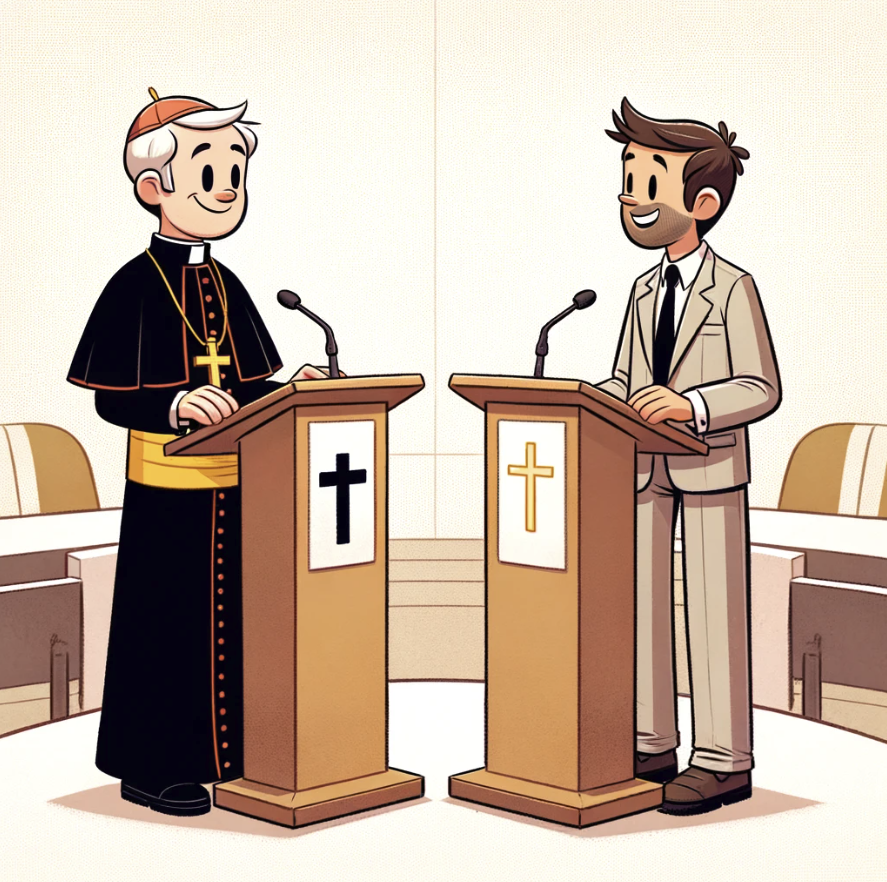Here’s a breakdown of the key differences between Catholics and Protestants, focusing on historical origins, core beliefs, and practices:
Origins of the Split (16th Century)
- Catholicism: Represents the continuation of the early Church established by Jesus’ apostles. The Pope is seen as the successor of St. Peter, the leader of the apostles.
- Protestantism: Emerged from a reform movement challenging the Catholic Church’s authority and practices. Martin Luther, John Calvin, and other reformers initiated the Protestant movement.
Core Beliefs
- Salvation: Both believe in salvation through faith in Jesus Christ. However, Catholics emphasize the role of good works alongside faith, while Protestants believe faith alone is sufficient.
- Authority: Catholics rely on the Bible and Church teachings (including pronouncements by Popes) for guidance. Protestants consider the Bible the sole source of authority (Sola Scriptura).
- Sacraments: Both consider sacraments important, but differ in number and interpretation:
- Catholics recognize seven sacraments (Baptism, Eucharist, Confirmation, Reconciliation, Anointing of the Sick, Holy Orders, and Matrimony).
- Protestants recognize fewer sacraments (often just Baptism and Communion).
- Eucharist: Catholics believe the bread and wine become the body and blood of Christ (transubstantiation) during the Eucharist. Protestants have varying views – some believe it’s a symbolic representation, while others hold to a real presence of Christ but not a physical transformation.
- Virgin Mary: Catholics venerate Mary, the mother of Jesus, and believe in her perpetual virginity. Protestants generally hold Mary in high regard but don’t venerate her.
Practices
- Clergy: Catholic priests are celibate males. Protestants have married clergy and allow women as pastors in some denominations.
- Religious Roles: Catholics have a distinction between clergy (priests) and laity (everyone else). Protestants emphasize the priesthood of all believers – that all have a direct relationship with God.
- Religious Hierarchy: The Catholic Church has a centralized structure led by the Pope. Protestants have a wider variety of denominations with varying degrees of centralized authority.
Additional Points
- Emphasis on Tradition: Catholics place a stronger emphasis on Church tradition alongside the Bible. Protestants generally view tradition with more caution.
- Modernization: Both denominations have undergone reforms and continue to adapt to the contemporary world. However, the core differences remain.
Understanding these core distinctions can help you grasp the broader landscape of Christianity.
Let’s look at some Q&A:
Eastern Orthodox vs Catholic vs Protestant: what are the similarities and differences?
Similarities:
- All three traditions believe in the Trinity: Father, Son, and Holy Spirit.
- They recognize the authority of the Bible as scripture.
- They celebrate the sacraments, including baptism and the Eucharist/Communion, though the understanding and number of sacraments may differ.
- They trace their origins to the early Christian Church and adhere to core Christian doctrines such as the resurrection of Jesus.
Differences:
Eastern Orthodox vs Catholic:
- Authority: The Orthodox Church operates as a communion of autocephalous (self-governing) churches without a single leader equivalent to the Pope. In contrast, the Catholic Church has the Pope as its supreme authority on earth.
- The Filioque clause in the Nicene Creed: The Orthodox Church recites the original version (“proceeds from the Father”), while the Catholic Church uses an amended version that includes “and the Son” (Filioque).
- The Orthodox Church emphasizes theosis (deification) as the process of becoming more like God, while Catholicism places more emphasis on the juridical aspects of salvation and sanctification.
Eastern Orthodox vs Protestant:
- Protestant churches generally reject the hierarchical structure of the Orthodox Church and lack the apostolic succession claimed by the Orthodox.
- Theology and liturgy: Orthodox liturgy is ancient and elaborate, similar to Catholic liturgy but with its unique elements and traditions, while Protestant services are often simpler and more varied.
- Sacraments: Orthodox Christianity practices seven sacraments like Catholicism, whereas many Protestant denominations recognize only two (baptism and Communion).
Catholic vs Protestant:
- Authority: Catholics accept the Pope’s authority and the tradition of the Church as guiding interpretations of the Bible. Protestants rely primarily on the Bible as the source of authority.
- Justification: Catholics believe in justification through faith and works, while many Protestants believe in justification by faith alone.
- Sacraments: The Catholic Church recognizes seven sacraments, but most Protestants accept only two as ordinances (baptism and the Lord’s Supper).
Is Catholicism considered Protestant?
No, Catholicism is not considered Protestant. Catholicism and Protestantism are two distinct branches of Christianity.
The Protestant Reformation in the 16th century led to the split from the Roman Catholic Church, resulting in the formation of various Protestant denominations.
Catholicism predates this split and maintains traditions and practices that differ significantly from those of Protestant denominations.
Related


